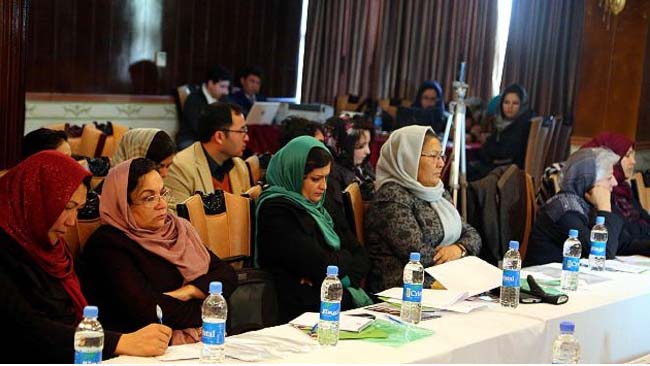A women’s rights organization in Afghanistan has expressed concerns over possible compromise of the rights of the Afghan women in the peace talks with the Taliban. In a report on women’s status in the peace process, Women and Children Legal Research Foundation has mentioned barriers to women’s participation in the process of peace negotiations with the Taliban. The women rights advocacy group has stated that opposition of the Taliban and apparent unwillingness of the Afghan authorities against participation of women in the peace process jeopardize women’s rights in the process of talks with the militant groups. The group called on the government to ensure sufficient participation of the Afghan women in the peace talks.
The Afghan government last week hosted a meeting of Quadrilateral Coordination Group (QCG) - Afghanistan, Pakistan, China and the United States –to establish a roadmap for peace talks with the Taliban. It was the second of such meetings and the third meeting is set to be held again in February in the Pakistani capital Islamabad. The four-party talks are viewed as highly promising for another round of genuine peace negotiations between the Afghan government and the Taliban after failure of many attempts to kick-start negotiations with the militant groups. However, what has been always worrying for many is prospect of civil rights and women’s status negotiating peace with Taliban.
Afghan activists say while a number of women have membership of the High Peace Council, there was no woman representing Afghan women in the four-nation talks in Kabul and Islamabad. The national unity government has assured that women’s rights would not be up to compromises in the talks for a peace deal in the country. President Ashraf Ghani has asserted that parts of the constitution related to the rights of the citizens and the structure of the political system in the country would not be up to negotiations in the peace process. Despite the pledges, absence of women representatives in the four-way talks for resumption of the peace negotiations with the militant groups could be an indication of a waning commitment of the government for active participation of the women in the process.
Inevitably, the matter of women’s rights would be one of the key issues in any peace negotiations with the Taliban. In the last fourteen years, the Taliban maintained its misogynistic stance in the past over a decade of the conflict by burning down schools and pouring acid on school girls. The Taliban continue to impose severe punishments against women such as stoning without going through proper judicial processing. Given the views of the Taliban on women’s rights, the group would surely demand renegotiation of women’s rights and freedoms in the course of peace talks. Imposing violent Taliban-style Sharia is one of the key objectives of the militant group in their campaign against the government. The government has not specifically described how it will protect women’s rights in the course of the talks and what will be the red lines in the discussions.
With the onset of the phase of formal talks, the Afghan government will be tested for its commitment in protecting women’s rights while negotiating with the Taliban. The Taliban were suppressive to women during their rule in Afghanistan, and remained hostile to women’s public presence in the last fifteen years of their insurgency in the country. Under the Taliban rule, girls were not allowed to go to schools and women were banned from going out without accompany of a male family member. However, the group has hinted some flexibility towards educating girls, signifying a considerable shift in the group’s approach on women’s rights. For the first time since the fall of their regime in 2001, Taliban members sat face to face with Afghan women representative in Norway last year and discussed the prospect of peace and women’s rights in Afghanistan. The meeting in Norway marked a milestone for Taliban sitting at the same level with women activists discussing peace and rights issues.
Despite some flexibility from the Taliban over women’s rights, the fact is that the Taliban is not prepared for accepting all rights for women as envisaged in the Afghan constitution. The Afghan government has said it is ready for negotiating the constitution, though making exceptions for chapters on rights and government’s system. This makes some crucial achievements of the past fifteen years including women’s rights particularly vulnerable to unexpected compromises between the two sides. The Afghan government needs to start campaigning for promotion of women’s rights on the national level before any formal talks with the Taliban starts.
The government must remain committed to promote women’s rights and would not leave it open for negotiations with the insurgent groups. For this, the government needs to take specific measures to ensure the pubic and pro-rights groups that women’s rights would be protected in the course of peace negotiations with the Taliban. Specific measures for boosting women’s representation in the process of peace negotiation would not only safeguard women’s rights for the future but also strengthens the government’s stance in the negotiations with the militant groups.
Women representatives will be able to play an important role in boosting the Afghan government’s stance in the negotiations with the Taliban. If the government fails to provide sufficient representation for women in the peace process, it would be forced to negotiate rights issues from a weaker position against the Taliban.
Home » Opinion » The Prospect of Women’s Rights in Peace Talks
The Prospect of Women’s Rights in Peace Talks
| Abdul Ahad Bahrami

